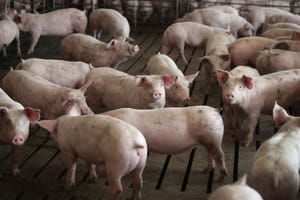Research conducted at North Carolina State University (NCSU) has concluded that early weaning (less than 19 days of age) places an adverse impact on gut health and defense against F18 postweaning E. coli
December 22, 2010

Research conducted at North Carolina State University (NCSU) has concluded that early weaning (less than 19 days of age) places an adverse impact on gut health and defense against F18 postweaning E. coli.
Researcher Adam Moeser of NCSU suggests that modest increases in weaning age could lessen enteric disease severity and subsequent economic losses.
F18 E. coli continues to be one of the most important enteric pathogens contributing to postweaning diarrhea
and gut edema disease, leading to mortality, morbidity and production inefficiency.
Previous studies at NCSU have shown early weaning (less than 18 days of age) causes a breakdown in gut defense mechanisms that may predispose pigs to gut disorders.
In the current study, 48 weaned pigs obtained from a commercial swine farm in North Carolina were divided into three weaning age groups:
15-16-day early weaning (EW);
18-19-day middle weaning (MW); and
20-21-day late weaning (LW).
At 23 days of age, eight pigs from each weaning age group were experimentally challenged with an oral strain of F18 E. coli to induce enteric disease.
Pig response was assessed over a four-day, post-challenge period. The
E. coli challenge produced diarrhea and reductions in weight gains in all weaning age groups.
However, E. coli disease was more rapid in onset and severity in EW and MW pigs than with LW pigs. Histological (tissue) analysis revealed a significant reduction in villus height (an indicator of intestinal absorptive surface area), and an increase in crypt depth (indicator of intestinal injury) and lamina propria cells (marker of intestinal inflammation) in EW and MW pigs compared to LW pigs.
Both EW and MW pigs also incurred increased intestinal permeability or decreased gut mucosal defense and increased levels of diarrhea.
Researcher: Adam J. Moeser, North Carolina State University. For more information, contact Moeser by phone (919) 513-0711 or e-mail [email protected].
You May Also Like



